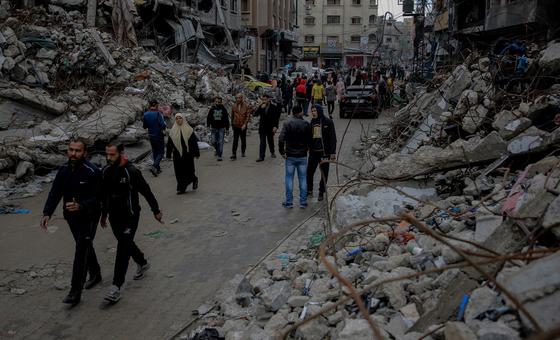Speaking ahead of Sunday’s grim milestone, Spokesperson Liz Throssell reiterated the need for OHCHR staff to have access to Israel and all parts of the Occupied Palestinian Territory to investigate human rights violations by all parties.
Fourteen weeks have passed since Hamas and other Palestinian armed groups carried out bloody attacks against Israel on 7 October 2023, killing 1,200 people and taking roughly 250 others hostage, 136 of whom are still believed to be in captivity in Gaza.
End the suffering
In response, Israel launched a massive and destructive military response. More than 23,000 Palestinians have been killed to date, mainly women and children, while civilian infrastructure including homes, hospitals, schools, bakeries, places of worship, water systems, and UN facilities, have been damaged or destroyed.
Ms. Throssell recalled that UN High Commissioner for Human Rights Volker Türk has repeatedly called for an immediate ceasefire “to end the appalling suffering and loss of life, and to allow the prompt and effective delivery of humanitarian aid to a population facing shocking levels of hunger and disease,” adding “this is more urgent than ever.”
Addressing the conduct of hostilities, she said OHCHR have repeatedly highlighted Israel’s recurring failures to uphold the fundamental principles of international humanitarian law, namely distinction, proportionality, and precautions in carrying out attacks.
War crimes risk
“The High Commissioner has stressed that breaches of these obligations risk exposure to liability for war crimes and has also warned of the risks of other atrocity crimes,” she said.
She noted that intense Israeli bombardments from air, land and sea are continuing across much of the Gaza Strip, particularly in the Deir al Balah and Khan Yunis governorates, where tens of thousands of people had previously fled in search of safety.
Meanwhile, Palestinian armed groups have continued to launch indiscriminate rockets towards Israel, some of which have been intercepted, she said.
Obligation to protect
Ms. Throssell urged the Israeli Defence Forces (IDF) to take immediate measures to protect civilians, in line with international law.
“Ordering civilians to relocate in no way absolves the IDF of its obligations to protect those who remain, regardless of their reasons, while carrying out its military operations,” she said.
Israel also must immediately end arbitrary detention, torture, ill-treatment and enforced disappearance of Palestinians in Gaza, she added, noting that hundreds of people are reportedly being held in several unknown locations both within and outside the enclave.
Desperation and dire shortages
OHCHR also highlighted the “desperate scenario” in northern Gaza, where people face dire shortages of food, water and other basic items.
“Access to humanitarian aid remains extremely difficult, despite repeated pleas by the UN to the IDF to facilitate movement of humanitarian aid convoys,” said Ms. Throssell, before turning to the situation in the south, where over 1.3 million displaced people are now crammed into the city of Rafah, which previously had 300,000 inhabitants.
Situation in the West Bank
Moving to the West Bank, she said OHCHR has verified the deaths of 330 Palestinians, including 84 children, since the start of hostilities. The majority, 321, were killed by Israeli security forces, while eight were killed by settlers.
She added that entire herding communities have been forcibly displaced due to settler violence, which may amount to forcible transfer.
Last month, OHCHR issued a report on the West Bank which stressed the need for an immediate end to the use of military weapons and methods during law enforcement operations. It also called for an end to arbitrary detention and ill-treatment of Palestinians, and the lifting of discriminatory movement restrictions.
“Lack of accountability for unlawful killings remains pervasive, as does impunity for settler violence, in violation of Israel’s obligations as the occupying power to ensure safety of Palestinians in the West Bank,” said Ms. Throssell.
OHCHR’s office in the Occupied Palestinian Territory, which continues to monitor and document the human rights situation in Gaza and the West Bank, will submit two reports to the UN Human Rights Council during its next session in February in Geneva.

